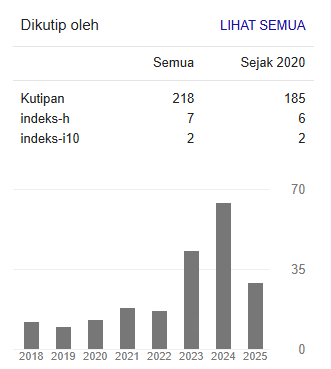SCHIZOPHRENIA ZIKIR THERAPY BASED ON THE INTERPRETATION OF MAFĀTĪḤ AL-GHAYB
DOI:
https://doi.org/10.20871/tjsq.v7i2.407Keywords:
Mental Health, Schizophrenia, Tafsīr Mafātīḥ al-Ghayb, Zikr TherapyAbstract
Modern humans face numerous complex life issues such as sadness, confusion, suffering, existential emptiness, stress, depression, and suicide. They strive to eliminate these problems from their lives, leading many to seek help from specialists to address their mental health concerns. Consequently, they often resort to various medications prescribed by doctors or psychiatrists, which can result in many developing schizophrenia. Schizophrenia is a complex mental illness that affects an individual’s perception, thoughts, and behavior. However, in mental health studies, researchers and psychologists frequently focus more on biological and social aspects, neglecting the spiritual dimension. Therefore, this study aims to present and examine the concept of zikir therapy through the perspective of a prominent Islamic scholar found in Tafsīr Mafātīḥ al-Ghayb, addressing various aspects of human life, including psychological and spiritual issues as discussed by Fakhr al-Dīn al-Rāzī. This research will analyze how al-Rāzī integrates zikir therapy into his interpretation of the Qur’an using a qualitative approach by identifying relevant Qur’anic verses such as Q.S. Yūnus [10]: 57, Q.S. Al-Isrā’ [17]: 82, Q.S. Asy-Syu‘arā’ [26]: 80, and Q.S. Ar-Ra‘d [13]: 28. Fakhr al-Dīn al-Rāzī’s thoughts on mental health emphasize the importance of soul balance and the role of spirituality, offering a rich perspective for therapists addressing schizophrenia through zikir therapy. The concept of soul balance can be linked to zikir therapy efforts in managing chaotic emotions and thoughts in patients with schizophrenia. Meanwhile, the emphasis on spirituality can provide patients with a sense of peace and hope while helping them find meaning in life.
References
Ali, Yunasril. Jalan Kearifan Suci. Jakarta: Serambi Ilmu Semesta, 2002.
Ardianti, Aprilia Aulia, Iceu Amira, and Nur Oktavia Hidayati. “Terapi Dzikir untuk Mengontrol Halusinasi Pendengaran Pada Pasien Skizofrenia: Case Report.” SENTRI: Jurnal Riset Ilmiah 3, no. 4 (April 5, 2024): 1972–80. https://doi.org/10.55681/sentri.v3i4.2569.
Arifin, Nur Afni Wulandari, Sinta Fresia, Harwina Widya Astuti, and Sherliana Novita. “Kontribusi Terapi Dzikir dalam Pemulihan Pasien dengan Gangguan Sensori Persepsi: Halusinasi Pendengaran.” Jurnal Kesmas Asclepius 6, no. 2 (August 15, 2024): 178–86. https://doi.org/10.31539/jka.v6i2.11324.
Arisandy, Widya, Suherwin Suherwin, Meita Hipson, and Nandita Oktapioni. “Penerapan Terapi Psikoreligius: Dzikir Pada Pasien Skizofrenia dengan Gangguan Persepsi Sensori Halusinasi Pendengaran.” Jurnal ’Aisyiyah Medika 9, no. 1 (2024): 360–70. https://doi.org/10.36729/jam.v9i1.1192.
Aswadi. Konsep Syifa’ dalam Al-Qur’an: Kajian Tafsir Mafatih al-Ghaib Karya Fakhrudin al-Razi. Sidoarjo: Dwiputra Pustaka Jaya, 2015.
Barbato, Angelo, WHO Nations for Mental Health Initiative, and World Health Organization. Division of Mental Health and Prevention of Substance Abuse. “Schizophrenia and Public Health,” no. WHO/MSA/NAM/97.6 (1997). https://iris.who.int/handle/10665/63837.
Dhahabī, Muḥammad Ḥusayn al-. Al-Tafsīr wa al-Mufassirūn. Kairo: Maktabah Wahbah, 2000.
Fitrikasaria, Alifiati, and Linda Kartikasari. Buku Ajar Skizofrenia. Semarang: UNDIP Press Semarang, 2022.
Ghofur, Saiful Amin. Mozaik Mufasir Al-Qur’an. Yogyakarta: Kaukaba, 2013.
Girsang, Gerhad P., Mawar G. Tarigan, and Edwin A. Pakpahan. “Karakteristik Pasien Skizofrenia.” Jurnal Kedokteran Methodist 13, no. 1 (June 30, 2020): 58–66.
Hakim, A. Husnul. Ensiklopedi Kitab-Kitab Tafsir (Kumpulan Kitab-kitab Tafsir dari Masa Klasik Sampai Masa Kontemporer). Depok: eLSiQ, 2013.
Hawari, Dadang. Pendekatan Holistik Pada Gangguan Jiwa Skizofrenia. Jakarta: Fakultas Kedokteran Universitas Indonesia, 2007.
Hutapea, Anjelika, Muhammad Tanzil Furqon, and Indriati Indriati. “Penerapan Algoritme Modified K-Nearest Neighbour Pada Pengklasifikasian Penyakit Kejiwaan Skizofrenia.” Jurnal Pengembangan Teknologi Informasi dan Ilmu Komputer 2, no. 10 (February 14, 2018): 3957–61.
Mahmud, Mani Abd Halim. Metodologi Tafsir: Kajian Komprehensif Metode Para Ahli Tafsir. Translated by Syahdinor and Faisal Saleh. Jakarta: PT Raja Grafindo Persada, 2006.
Mashudi, Sugeng. Buku Ajar Asuhan Keperawatan Skizofrenia. Surabaya: Global Aksara Pres, 2021.
Maulana, Indra, Taty Hernawaty, and Iwan Shalahuddin. “Terapi Aktivitas Kelompok Menurunkan Tingkat Halusinasi Pada Pasien Skizofrenia: Literature Review.” Jurnal Keperawatan Jiwa 9, no. 1 (February 14, 2021): 153–60. https://doi.org/10.26714/jkj.9.1.2021.153-160.
Misbakhuddin, Alfian Dhany, and Siti Arofah. “Zikir Sebagai Terapi Penderita Skizofrenia.” Spiritualita 2, no. 1 (July 25, 2018): 1–19. https://doi.org/10.30762/spr.v2i1.886.
Nakamura, Kajiro. Metode Zikir dan Doa Al-Ghazali. Translated by Uzair Fauzan. Bandung: Arasy Mizan, 2005.
Nasution, Harun. Ensiklopedia Islam. Jakarta: Djambatan, 1992.
Qaththan, Manna Khalil al. Studi Ilmu-ilmu Al-Qur’an. Translated by Mudzakir AS. Bogor: Pustaka Litera Antar Nusa 2011.
Rasmawati, Rasmawati, Yusni Pratiwi, Muthahharah Muthahharah, Syisnawati, and Alfin Edy Jayadi. “Dhikr Therapy Reduces Symptoms and Enhances the Functional Abilities of Schizophrenia Patients with Hallucinations: A Case Study.” Jurnal Kesehatan LLDikti Wilayah 1 (JUKES) 3, no. 2 (October 31, 2023): 79–85. https://doi.org/10.54076/jukes.v3i2.383.
Rāzī, Muḥammad Fakhr al-Dīn al-.Tafsīr al-Kabīr wa Mafātīḥ al-Ghayb. Beirūt: Dār al Fikr, 1989.
Sakandari, Ibn ‘Atha'illah al-. Zikir Penenteram Hati. Translated by Fauzy Bahreisy. Jakarta: Serambi, 2006.
Sari, Puspita. “Dinamika Psikologi Penderita Skizofrenia Paranoid Yang Sering Mengalami Relapse.” Psikoislamedia: Jurnal Psikologi 4, no. 2 (July 14, 2020): 124–36. https://doi.org/10.22373/psikoislamedia.v4i2.5751.
Setiawan, Virgo Nandang. “Konsep Jiwa Manusia (Dialektika Filsafat Jiwa Mulla Shadra dan Sigmund Freud).” Skripsi, IAIN Tulungagung, 2019. https://doi.org/10/10/Daftar%20Pustaka.pdf.
Sina, Ibn. Psikologi Ibn Sina. Translated by M. S. Nasrulloh. Bandung: Pustaka Hidaya, 2009.
Syukur, Amin. Sufi Healing: Terapi dengan Metode Tasawuf. Jakarta: Erlangga, 2012.
Downloads
Published
How to Cite
Issue
Section
License
Copyright (c) 2025 Nurfadila Ibrahim

This work is licensed under a Creative Commons Attribution 4.0 International License.






















